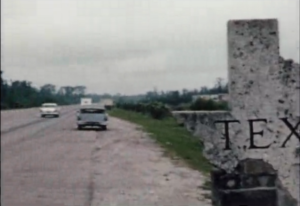
Published July 22, 2019
The first headline I thought of for this post was “Imagine the moon in your rearview mirror.” Experiences with readers taking things too literally prompted me to go with the one above. The thoughts are still essentially the same: What would it be like to go to the moon, then leave it?
I could have spent the whole weekend following the ongoing re-enactments of the Apollo 11 mission if I’d allowed myself. There were too many to choose from, sensory overload for my ADHD brain. Had I followed them closely, chances are I wouldn’t be having the thoughts I’m having today. Being so caught up in the moment over this procedure or that safety check or another aspect of the mission, one probably doesn’t have time to think such thoughts.
But what would that be like, the moon getting smaller and smaller behind you, and the Earth getting bigger and bigger as you returned to it? And, thinking about people I’ve written about whose most newsworthy moment came at a young age, what is the rest of your life like if you — in words unfair and too convenient — peak early? There is a part of me that regrets even typing that sentence, so back to this: What do you do after you’ve been to the moon?
The United States has had 50 years to ponder the question. Neil Armstrong and Buzz Aldrin left footprints on the moon, but what else? What part of themselves stayed behind? How did the experience change them in ways they never verbalized?
What would you be thinking as your spacecraft left the surface of the moon, and after that? Did that really happen? Did I dream it? Will it be hard to remember the details in 10 years? Was it? So many mysteries, even about memories, come to mind.
I’ve been watching a lot of NASA documentaries and related films lately, stirring memories. Would it have been better or worse to follow the buildup to, launch of and splashdown of Apollo 11 with ubiquitous social media on the side? Was I as focused and in the moment as I’d like to think I was, or did I have a comic book, encyclopedia or toy in front of me while I watched the news coverage?
 Speaking of documentaries, Netflix offers “Mission Control,” a look at the engineers and others who played key roles in the U.S. space program in those days. Watching it sparked more nostalgia, including a view familiar to someone who grew up half an hour’s drive from the Louisiana-Texas border and traveled across it for vacations and other fun trips. One of the latter was a high school field trip to NASA, where we saw the Mission Control room we had all seen on TV during the Apollo missions. Imagine Louisiana in your rearview mirror knowing you were on way to NASA’s Johnson Space Center (or to see a baseball team called the Astros, named for the astronauts). Imagine crossing the state line on your way there for your first job as an engineer, hired to help create a space program that didn’t yet exist.
Speaking of documentaries, Netflix offers “Mission Control,” a look at the engineers and others who played key roles in the U.S. space program in those days. Watching it sparked more nostalgia, including a view familiar to someone who grew up half an hour’s drive from the Louisiana-Texas border and traveled across it for vacations and other fun trips. One of the latter was a high school field trip to NASA, where we saw the Mission Control room we had all seen on TV during the Apollo missions. Imagine Louisiana in your rearview mirror knowing you were on way to NASA’s Johnson Space Center (or to see a baseball team called the Astros, named for the astronauts). Imagine crossing the state line on your way there for your first job as an engineer, hired to help create a space program that didn’t yet exist.
I am certain everyone involved eventually had that moment where they thought “What now?” In the case of the astronauts who went to the moon, what was it like to go and return? Wondering about that is fascinating to me.
As for the return, and specifically the splashdown, I learned something over the weekend that I hadn’t known before. Astrophysicist Katie Mack’s tweets below hint at the story, one I am guessing many people don’t know either.
Sometime around now, 50 years ago, my grandfather was figuring out that all three #Apollo11 astronauts were going to die if he couldn’t convince NASA he knew how to save them. Here’s the story: https://t.co/pRWiTGzUjc
— Katie Mack (@AstroKatie) July 21, 2019
There’s a summary of the story in text there but I recommend clicking “Download audio” and listening to the radio version if you can because it’s much better
— Katie Mack (@AstroKatie) July 21, 2019
I will never do anything that people will be talking about in 50 years. Even I need something to look forward to every day. How is that dynamic for someone who has been to the moon?
Photo of Earth on the horizon in the Mare Smythii region of the moon by Everett Historical via Shutterstock.